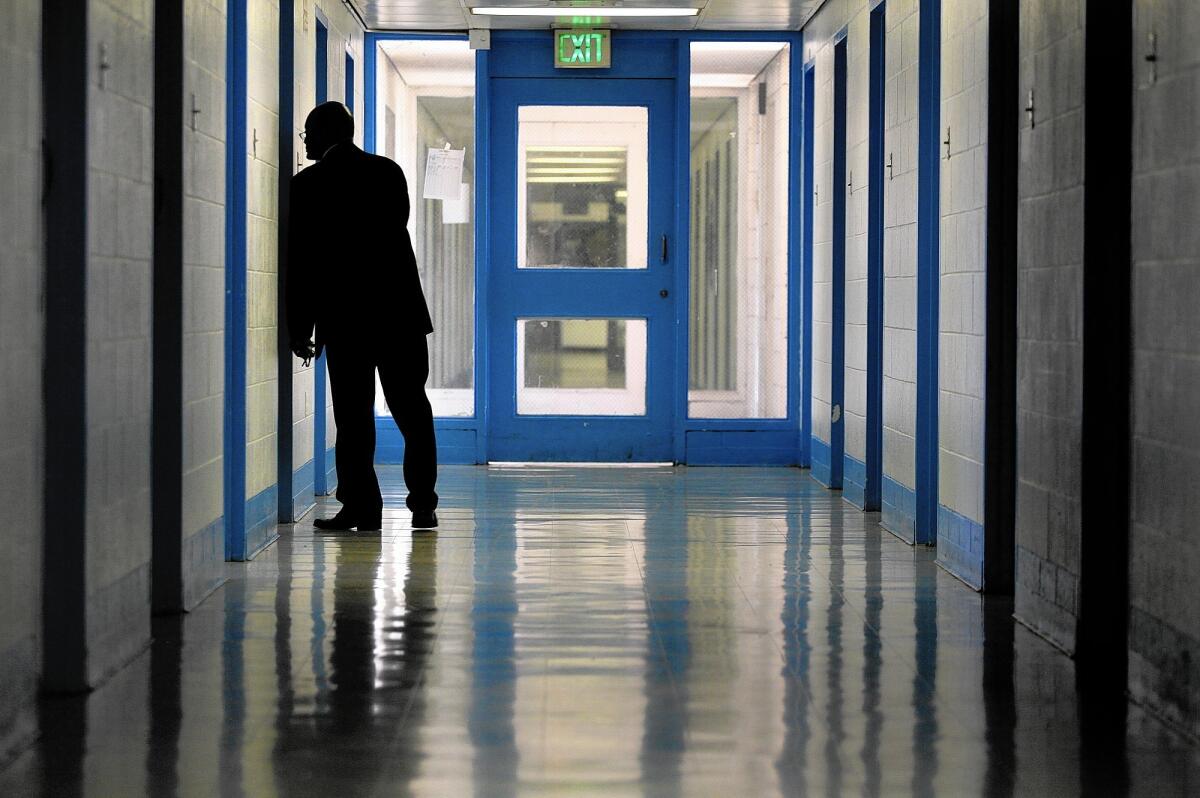Boy, 16, was given estrogen for behavioral disorder while in L.A. juvenile hall, suit alleges

- Share via
A 16-year-old boy being held at a Los Angeles County juvenile hall developed enlarged breasts after he was prescribed estrogen to treat a behavioral disorder, a move that baffled doctors who said the treatment defied medical logic, according to a lawsuit filed last month.
The teen, whose identity is being withheld because of his age, was diagnosed with oppositional defiant disorder, or ODD, two days after he was arrested and housed at Eastlake Juvenile Hall in June 2019, the lawsuit said. Medical records reviewed by The Times show that the teen’s testosterone levels were “slightly high” when the doctor who diagnosed him prescribed daily doses of estrogen.
Estrogen regulates the development of female sexual characteristics and reproduction. Men produce the hormone at much lower levels.
After taking approximately 13 daily doses of the hormone, the teen was diagnosed with gynecomastia, defined as the enlargement or swelling of breast tissue in males whose estrogen level is too high, medical records show.
ODD, a behavioral condition that is sometimes suffered by patients with attention deficit hyperactivity disorder, is normally treated with therapy, said James McGough, a professor of clinical psychiatry at UCLA.
“Estrogen is not a treatment for ODD. I can’t be more emphatic about that,” McGough said. “You won’t find a reference anywhere that supports the use of estrogen for ODD.”
The lawsuit described the treatment as “experimental.” The doctor who prescribed the estrogen, Danny Wang, could not be reached for comment.
Los Angeles County’s juvenile detention facilities are overseen by the Probation Department. Medical needs are provided by Juvenile Court Health Services, which falls under the county Department of Health Services. In an e-mail, a Department of Health Services representative confirmed that Wang has been employed by the county since 2012 but declined to comment on his current status with the agency, describing it as a “confidential personnel matter.” The department declined to comment on the lawsuit.
The suit — which names as defendants the county, Wang and David Oh, medical director of Juvenile Court Health Services — alleges medical battery and negligence.
Probation officials and the teen’s attorney, Wesley Ouchi, declined to say why he was in custody. Ouchi said the boy, now 17, was released in April and will require surgery to treat the physical issues he developed as a result of the estrogen treatment.
Wang prescribed a daily regimen of 2 milligrams of estrogen to be taken in pill form, according to medical records. The boy’s parents were not aware that he had been diagnosed with ODD or was undergoing treatment until late July 2019. Doctors said the treatments should not have been carried out without the parents’ consent.
The boy’s father, who spoke on the condition of anonymity to protect his son’s identity, said he found out about the estrogen pills when he visited the juvenile hall one weekend last July.
“When I found out they were giving him the pill, I was like, why didn’t they ask me? When I found out what kind of pill was it, I was like, this is terrible,” the father said. “He’s only 16, and they were forcing him to take it.”
The father said he later confronted Oh, the medical director, over the phone. Oh admitted that Wang had made “a mistake,” the father said. The health services representative declined to comment on Oh’s alleged remark due to the ongoing litigation.
The treatments stopped last July, after the teen began to complain of negative side effects and refused medication, records show. Prior to that, Ouchi said, his client felt compelled to take the pills because he feared that disobeying Wang would have a detrimental effect on his pending criminal case.
Reports from probation officers about a youth’s time in custody can carry significant weight at sentencing hearings, and the teen’s case had not been adjudicated at the time Wang prescribed him the estrogen, Ouchi said.
Ouchi also alleges the boy was bullied by other youths in custody once his gynecomastia symptoms developed.
“As a teenager, he felt self-conscious already,” Ouchi said. “Going through these changes made it a lot more traumatic for him.”
Sara Coffey, director of child and adolescent psychiatry at Oklahoma State University, said ODD is normally diagnosed in children between the ages of 6 and 12. Children diagnosed with the disorder often struggle with authority, in school or in social settings. Common treatments include family therapy or medications that have had success in aiding juveniles with ADHD, including Ritalin and Adderall.
Using hormones to treat ODD might actually worsen the situation, Coffey said.
“The other concern I have, as a psychiatrist, is that we know hormones play a role in mood,” she said. “If his mood got disrupted, that could only further complicate things.”
Estrogen is normally stocked at L.A. County juvenile facilities for use as part of hormone therapy for contraception and treatment of gender dysphoria, according to the health services representative.
The boy’s father said the hormone therapy has had a long-term effect on his son, who now scares easily and has become antisocial.
“He’s like a different person. He just wants to be in his room, and he don’t come out for nothing, all day in his room,” the father said. “He was never like that.”
Times staff writer Jaclyn Cosgrove contributed to this report.
More to Read
Sign up for Essential California
The most important California stories and recommendations in your inbox every morning.
You may occasionally receive promotional content from the Los Angeles Times.











